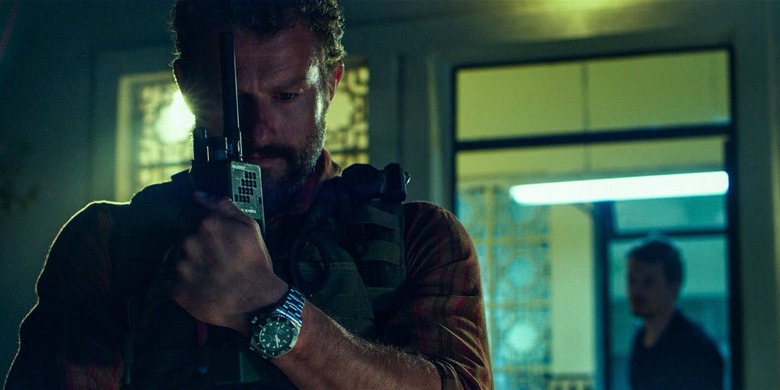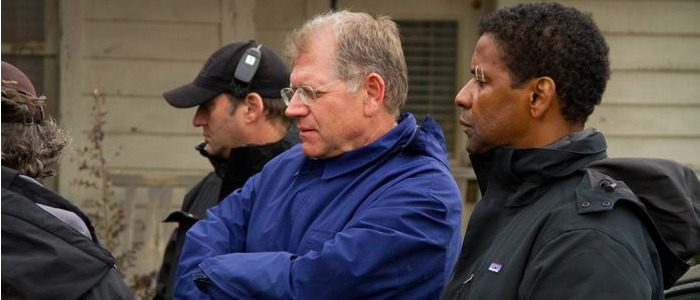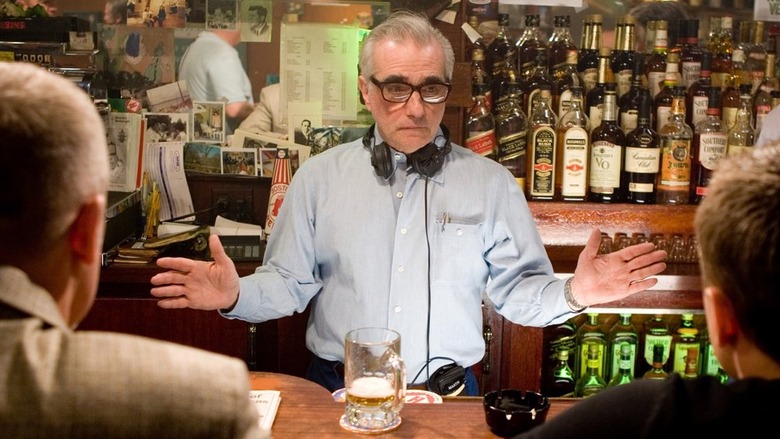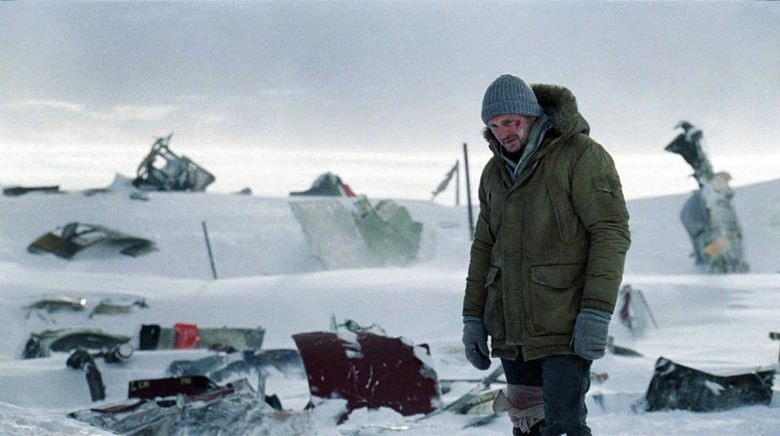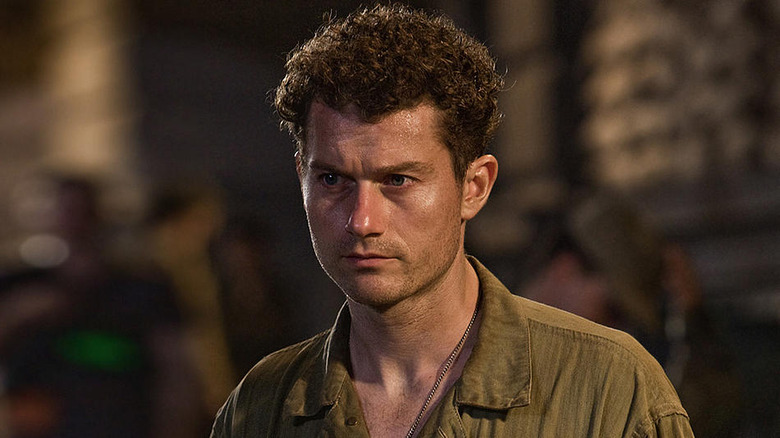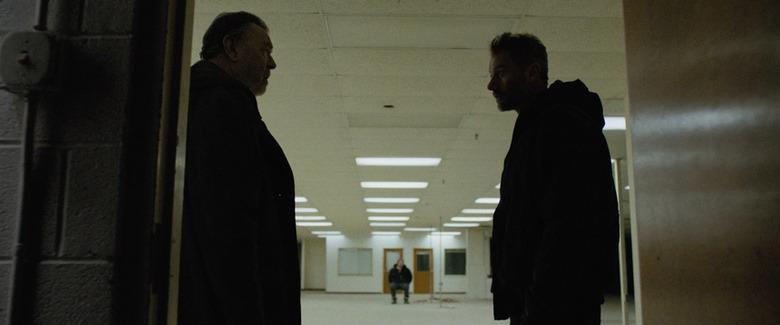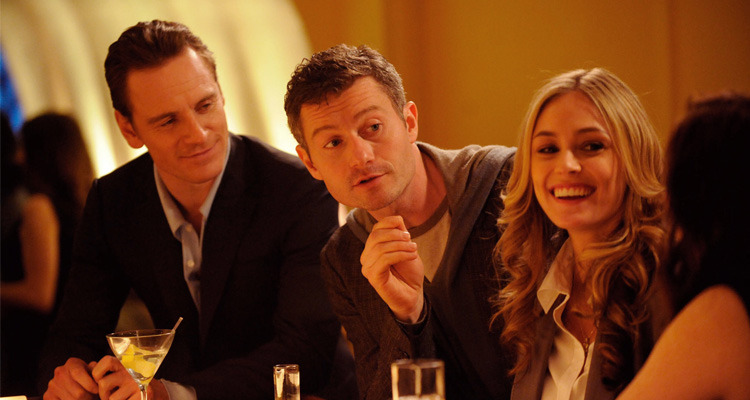'The Standoff At Sparrow Creek' Star James Badge Dale Shares Stories Of Michael Bay, Martin Scorsese, And More
Over the last 10 years, actor James Badge Dale has built himself one mighty impressive resume. Badge Dale's career began when he was a kid in 1990 with a role in an adaptation of Lord of the Flies, but after that, and years after playing hockey and suffering an injury, he went to the theater where he found his passion for acting. Since his theater days, he's delivered consistently high quality of performances for some of the best filmmakers around.
Now, he's the lead in The Standoff at Sparrow Creek – a tense mystery mostly set in one location about a militia trying to discover which one of their own was behind a shooting at a police funeral. As a former cop turned militia man, Badge Dale brings a real sense of urgency to writer-director Henry Dunham's propulsive thriller. When speaking with the actor about the film, he not only told us about his experience on his latest movie, but some of his past jobs as well, from The Departed to The Pacific to working with Michael Bay and more.
13 Hours: The Secret Soldiers of Benghazi
Every actor who's worked with Michael Bay has a Michael Bay story. In fact, probably a lot of stories, so when we asked Badge Dale for his story about one of the world's most popular filmmakers, he sounded more than happy to share. Now, his telling of his time with Bay over the phone was very animated and since print doesn't fully do it justice, here's the audio:
Or you can give it a read:
Michael Bay ... yeah. Let's get into this 'cause I love him, too, man. In a strange way, like working with Steve McQueen was a lot like working with Bay because they work at a quick pace, also. When I met with Bay and we sat down, and it was kind of the final meeting, he goes, "I've got two questions for you." He goes, "Can you work fast and how are you with yelling?" I said, "I like working fast and I don't mind yelling if you don't mind me yelling back." And he goes, "Great. We're gonna get along perfect."
Bay, he's intense and he shows up. There's maybe like five guys in the world that can do what Bay can do with a camera. Like Bay is extremely ... and I mean this in the best way, because I'm a film nerd also, but Michael Bay is a film nerd. He loves cameras, he loves movies, he knows how to make them. He's obsessive and he lives his entire life thinking about this stuff. And you know, John Krasinski turned to me on day two, and we're watching Bay. I mean, he's grabbing the camera, he's just orchestrating everything himself, at a break-neck pace, and Krasinski goes, "This is the best film school I've ever seen." You're literally watching this thing happen right in front of you, and he vocalizes it right in front of you. It's an amazing process.But yeah, he's intense man. My favorite [story] ... Look, Bay and I get along very well, but Bay is kind of like a sprinkler system. Eventually you're gonna get wet, you know what I mean? The sprinklers gonna hit you. Bay is the type of guy that like he yells at you and you yell back at him, he starts laughing with a big smile, and then you guys are best friends, you know what I mean?So I knew it was gonna hit me at one point and we're both kind of running around. We're in the compound in Malta. There's some confusion as to what we're shooting. A 21-year-old AD — it was his first movie — this kid was named Rory. He was from London. He goes, "Badge, I need you in this other room." He pulls me in this other room, he dives under a desk, and he goes, "Rolling." And I'm standing in this room and there's no camera. I don't know what's happening. I was like, "What do you mean we're rolling? What are we doing?" And Rory goes, "I don't know. You're getting weapons out of a locker." So I hear, "Action." I think the camera's outside, I'm not sure. I start pulling out weapons, I'm checking ammo, I'm doing the whole thing, and I hear Bay go, "Cut." Sorry for my language, but this is the way it's going down. "Badge, what the fuck are you doing?"And I look outside and Michael Bay is storming at me, all six-four of him, like in front of the whole crew, and I'm like, here's my time. So I kick open the door and I start walking towards him, and I'm like, "I don't know. What the fuck are we doing?" And he goes, "We're doing the fucking scene." And I go, "What fucking scene?" And he literally stops, he looks at me and he goes, "Oh, no one told you?"Yeah. He's so intense to work with. He's so fast. And by the end of that film ... Our first camera guy was a guy named Roberto, and it was a real high-speed, Italian camera guy. And Bay would come over to me, with Roberto and DP and would be like, "Hey, are we lit here?" And he would say, "Yeah." And Bay would be like, "Hey, can you guys shoot this, this, this? These are my ideas of shots that we still need and I trust you guys to do it, and I'm gonna go over and shoot something else." When a director trusts his camera guys and his actors to do stuff like that, it was a big moment for me, like I knew Bay trust me to make his movie, and I trust him as a director to make the film also.
Flight (Directed by Robert Zemeckis)
A director Badge Dale says is on the opposite side of the spectrum of Michael Bay: Robert Zemeckis, who directed the actor as a cancer patient in Flight, and years later, cast him as a guy who simply wants to help pull off a miraculous feat in The Walk. The actor's got nothing but love for Zemeckis:
I love Bob. I love him. And you're right, it is a very different approach [compared to Bay]. You know, but Bob's the kind of guy ... there's a similarity. This idea of working fast is Bob's the kind of guy who he'll do a take and then he'll come up to you and he'll change it up completely. He'll come up and say, "You bring me dialogue." He likes to work creatively and impulsively, also. And he's very good with the crew, has a great attitude. I love him. I've done two movies with him, and I'm grateful for that.
The Departed (Directed by Martin Scorsese)
Badge Dale was 26 years old when he co-starred in The Departed and played a part of that bloody elevator sequence. He has fond memories of his co-stars and Scorsese, and shooting the death scene, but he couldn't be a more different actor than he was then. The 2006 Best Picture winner was another learning experience for Badge Dale:
That's the one movie I wish I could do over. I was so young and I was so nervous. And we all questioned whether we belonged or not. I don't know if I was ... how do I say this? I think I would participate more if I could go back in time, you know what I mean?
You know, it was a growing period for me. I learned what not to do on that film, in some ways. When you're working with Leo and Matt, and these guys who work so well ... I was acting hard, you know what I mean? And I would come in and Matt would be like, "I'm not too sure what I'm doing. Roll the cameras." And it was that thing, that spark of Matt would come in and it's not planned. Matt would come in and the ideas would happen instinctually, in the moment. He had done so much homework that he could throw it all away and then just be free. And you know, working with him changed me as an actor. I learned a lot from him. He taught me that it was okay to be nervous.I was 25 years old. You don't want to let people know you're nervous. Matt would be like, "I'm nervous. I don't know what I'm doing," and he would do it anyway. And that's the type of actor you want to be, 'cause that's the actor you want to work with. You don't want to look over at an actor and the actor goes, "I know what I'm doing no matter what." You don't want to work with that guy. You want a sparring partner. You want someone that's actually actively exploring at every moment. And Matt and Leo are those guys.I'll never forget, we did that death scene and Leo was like, "Hey Matt. Come here and talk to Marty with me." And Matt, Leo, Anthony Anderson, and I, Marty showed us a little bit of an Akira Kurosawa film, so he was like, "Think of the scene as a metronome. And it's just gonna kick back and forth. Tick, tock, tick, tock, and everything is gonna happen at this pace right here." And then we shot it for two days and just kept that in mind the entire time.
The Grey (Directed by Joe Carnahan)
Similar to Flight, Badge Dale leaves a lasting impression with little screen time as a dying man in Joe Carnahan's existential survival film. Like Michael Bay, Carnahan apparently likes to use a bullhorn when he has to but with a very different temperament:
You know what, it's interesting, the similarity of all these guys. Joe is the type of guy... look, I don't like it when people are on bullhorns, but Joe's good on a bullhorn. And in the middle of the scene, Joe will get on the horn and literally give you new dialogue in the middle of the scene. And you can't break. You just stop, listen, go back and then get back into it. And Joe is really good with the crew. Everyone has a great attitude, and we played music in between setups, and he loves filmmaking. He's obsessive. I love working with him. And that was a special movie. Now that was a great group of guys, you know? Liam [Neeson] and Dermitt [Mulroney], and Frank Grillo, my boy, Dallas Roberts. We had a good time. It was cold, though. It was a cold movie.
The Pacific
A job that was deeply meaningful to Badge Dale, both as a person and actor, was this Steven Spielberg-produced HBO miniseries about marines in World War II. When asked about the pivotal experience in his career, Badge Dale first had to sing the praises of a recently Oscar-nominated pal he worked with on the miniseries:
Oh ... hey, before we go into that, I just gotta give a big shout out to my Pacific brother, Rami Malek, who I could not be happier for and more proud of. He's an amazing actor and an awesome human being. And that experience, that job ... we all got very close. It was a very intense experience. It was very unique and I've never worked a job like that and I don't think another job will come around like that. It's hard to put into words what that job did to us, what it meant to us, and I'm just really happy that people and their families get to watch that. But you know, we became very close and I'm still good friends with all those guys, today.
As Badge Dale said earlier about The Departed, he felt a little uncertain during that time. Still, when asked about when he believes he gained more confidence or found his groove as an actor, he pointed back to the HBO miniseries:
I'll wrap it back to The Pacific. You know, like I said, that was a big experience for all of us on that film, and if I could put a marker in time where I stopped caring if it was ... how do I say this ... right or wrong. Where I stopped caring if you like it or not. We were put in a circumstance where you know what, you have to trust yourself and trust your ability, as an artist, as an actor. And you're like, this is my interpretation, this is what I give. And I'm not trying to give you what you want, I'm giving you what I can give you. So there's honesty in that. We all grew up on that job.
The Standoff at Sparrow Creek (Directed by Henry Dunham)
There'a a precision to every second of The Standoff at Sparrow Creek, and a vitality that makes the stakes feel high from beginning to end. Every movement, cut, and transition runs like clockwork. It's a very strong vision for a thriller, and throughout the making of it, Badge Dale had what he calls Dunham's "bible":
This was just one of the most unbelievable things I'd ever seen. We show up to the first table read, and we're meeting everybody and he's like, "Here's the movie," and he pulled out a book that he had been working on for about nine years. And I mean it is the entire movie, frame by frame. Hand drawn by himself. And that kind of was our Bible, per se, and we went off that. So you kind of had an idea of the visual element that he was going for. And the visuals he was going for were very specific and they were very strong.
And you know, Brian Garrity and I had this conversation on day three. We were looking in the bonnet and in some way, you're taking pressure off the actor because the visuals are doing the work for you. And when Henry asks you to stand in a certain place and not move, he's doing it for a reason. And if you deviate from that, you ruin the frame. And if you ruin that frame, you're really ruining his vision. So we really wanted to come in and make Henry's movie. It's a very different film. I haven't seen a film like this in quite some time.
Shame (Directed by Steve McQueen)
Steve McQueen, the visionary filmmaker behind 12 Years a Slave and Widows, is completely game when it comes to throwing the script out the window and seeing what magic him and his actors can work on the day together. Badge Dale's experience with both McQueen and Michael Fassbender was another job that left him a changed actor:
You know, every job is different. But I've worked with some fast directors, and something happens when you're forced to take risks, quickly. I did a movie called Shame with Steve McQueen. That movie would mess up your love life. Just don't bring a date to go see Shame. But, we were quick, and this was Steve McQueen's mantra. He changed me. And honestly, Fassbender kind of sat me down and chased me also, so I owe a lot to those guys because the way it worked was I had to prepare more than I ever had for anything.
You have to know that script in and out, and then show up to work, and then Steve would say, "I hate all the dialogue. Rewrite it. Do it right now and improv the whole 7-page scene. Imrov it." And then you do one take and you're like, "Great. I have that. Do something different. Don't repeat one thing you did before." And he works at a break-neck pace. I mean, we were smashing through days. We'd finish a full day's work before lunch, and then Steve McQueen was like, "You know what I'm gonna do? Let's do this scene," and he'd pull a scene out from the schedule that you're not supposed to do 'til two weeks from now. And you better be able to show up, and you better be able to do it. And it changed me as an actor. That's a strange thing to say.
While McQueen is known for making movies that weigh heavily on the mind, he has a good sense of humor most of his work probably doesn't suggest, although Shame does have its odd funny moments. Badge Dale – who when he says he loves a director, really sounds like he means it – has plenty of memories of McQueen having a laugh during the making of, of all movies, Shame:
Steve's a big gregarious personality, man [Laughs]. I mean, there were takes Fassy and I were doing ... I mean, we're doing it, we're improving this whole damn thing, and out of the corner of my eye on one take, I could see Steve McQueen rolling on the ground, in front of the monitor, laughing. Like, holding his stomach and trying not to laugh out loud to ruin the scene. I love that man. I love that man to the bottom of my heart.

